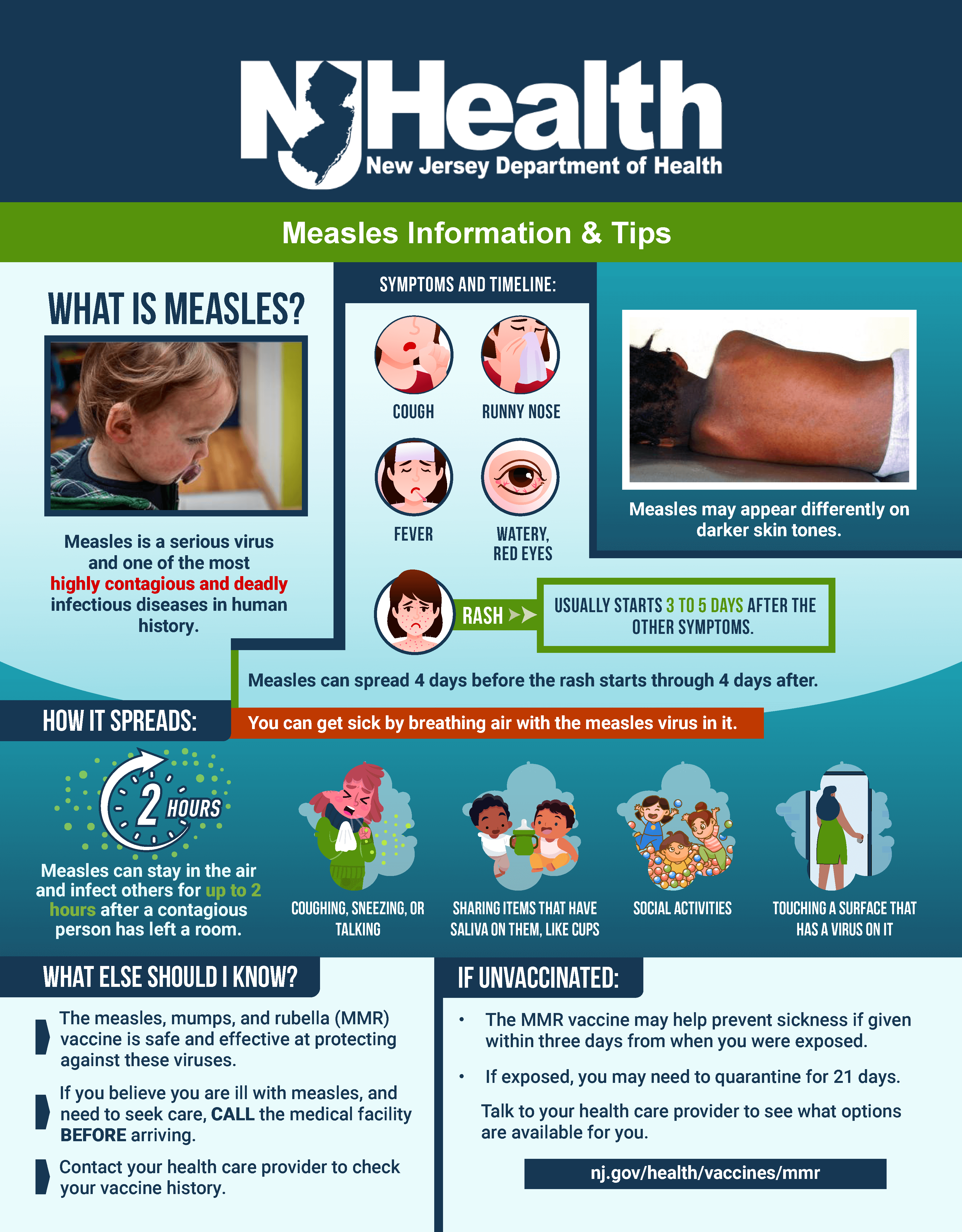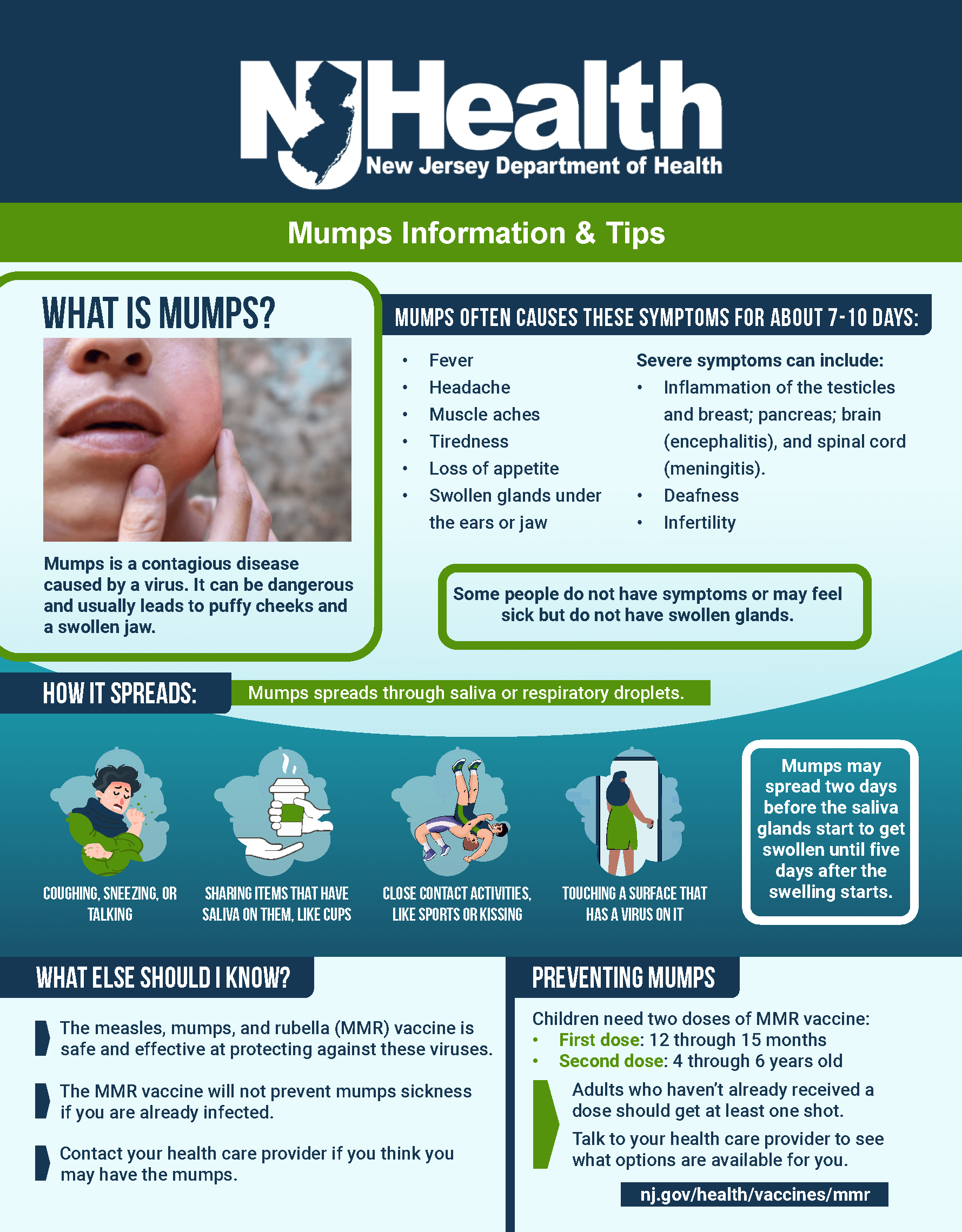Healthy New Jersey
Measles, Mumps, and Rubella (MMR)
Measles, Mumps, and Rubella (MMR)
Measles, mumps, and rubella can cause serious harm—but the MMR vaccine is a safe, proven way to protect yourself, your child, and your community. It’s one of the easiest and most effective steps you can take to prevent these contagious diseases.
Key Takeaways
- The MMR vaccine protects against measles, mumps, and rubella—three contagious diseases that can cause serious health problems.
- Children should get two doses: the first at 12–15 months, and the second at 4–6 years old.
- Teens and adults should be up to date—especially if attending school, working in health care, or traveling internationally.
- Anyone 6 months or older traveling abroad should be protected. Talk to your health care provider before traveling.
- Getting the MMR vaccine helps protect your health and the health of your community, including babies and others who can’t be vaccinated.
About the MMR Vaccine
The MMR vaccine protects against measles, mumps, and rubella—three diseases that spread easily and can lead to serious health problems.
The vaccine is given in two doses, usually starting in early childhood. It’s been used safely for decades and is highly effective at preventing illness.
Most people who are vaccinated with MMR will be protected for life.
Why It Matters
Measles can lead to:
- High fever and rash
- Ear infections and diarrhea
- Pneumonia (lung infection)
- Encephalitis (brain swelling)
- In some cases, death
Mumps may cause:
- Painful swelling of the face, testicles, or ovaries
- Hearing loss
- Brain and spinal cord infections (meningitis or encephalitis)
- Lower fertility in some cases
Rubella can cause:
- Arthritis in up to 70% of women who get infected
- Brain infections
- Bleeding problems
- Miscarriage
- Death of newborns shortly after birth
The MMR Vaccine is Safe and Effective
The MMR vaccine has been thoroughly studied and used safely around the world for decades. Most people experience no side effects beyond mild soreness or a low fever. Serious side effects are very rare.
When you or your child gets the MMR vaccine, you're protected—and so is your community.

Recommendations
Children need 2 doses of the MMR vaccine:
Teens and Adults
Need 1 or 2 doses of MMR vaccine if they haven't been vaccinated or don't have evidence of immunity. Doses should be separated at least 28 days apart.
International Travelers
Should be fully vaccinated before traveling. Infants 6–11 months old should get 1 dose of the MMR vaccine before travel. Then they should get 2 more doses after their first birthday.
Why Getting the MMR Vaccine is Important
The MMR vaccine is important for several reasons:
Prevents Serious Illness
Measles, mumps, and rubella can lead to severe health complications. The MMR vaccine significantly reduces the risk of these illnesses.
Protects Others
Babies, pregnant women, and people with weak immune systems rely on others to be protected. Getting the vaccine helps shield them.
Keeps Communities Healthy
When enough people are vaccinated, diseases have a harder time spreading. This community protection helps prevent outbreaks.
Protects Travelers
Measles, mumps, and rubella are still common in many countries. If you’re traveling, even to developed countries, make sure you're protected.
Possible Side Effects
Most people don't have any side effects from the vaccine. Possible side effects are usually mild and go away on their own, such as:
- Soreness, redness, or swelling at the injection site
- Fever
- Mild rash
- Temporary pain and stiffness in joints
More serious reactions are very rare. They may include high fever that could cause a seizure. Contact your health care provider if you notice anything unusual.
Finding and Paying for the Vaccine
You can get the MMR shot from your health care provider, local health department, pharmacy, urgent care center, or community clinic. Many locations also participate in vaccination events or offer low-cost options—call ahead or check online to confirm availability and any costs.
Vaccine Costs
There are a few ways to cover the cost of vaccines:
Health Insurance
Most private insurance plans and Medicaid fully cover the MMR vaccine with no out-of-pocket cost.
Vaccines for Children (VFC) Program
If your child is uninsured, underinsured, Medicaid-eligible, or American Indian/Alaska Native, they may qualify for free MMR shots through the VFC Program. Ask your provider or local health department if they participate.
 Official Site of The State of New Jersey
Official Site of The State of New Jersey


